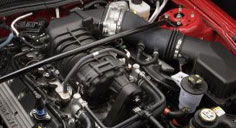Your engine is the most complex component in your vehicle, and the experts at Ford and Lincoln Mercury Dealerships are fully qualified to make sure yours is running at its best. They know every sensor, every wire and every hose—no matter how new your vehicle is.

Spotting Engine Trouble
Your engine is the most complex component in your vehicle, and there are many symptoms that could signal trouble. You might need service if you notice any of the following symptoms:
- The "Service Engine Soon" light doesn’t turn on for a few seconds when you start the vehicle
- The “Service Engine Soon" light doesn’t turn off after the engine starts
- Fluids are leaking from the engine
- Damage to any of the engine components is visible
- Loud noises come from the engine
- Smoke comes out from under the hood
If any of these symptoms occur, you should schedule an appointment at your local Ford or Lincoln Mercury Dealership immediately.
Spotting Fluid Issues
You might need your transmission or coolant fluid flushed if you notice any of the following symptoms:
- Feel rough or hard shifting
- Experience repeated engine overheating
If any of these symptoms occur, you should schedule an appointment at your local Ford or Lincoln Mercury Dealership immediately.
Maintaining Your Engine
The best thing you can do for your vehicle is to get scheduled maintenance at the Dealership. Every vehicle maintenance schedule includes the following:
- Inspection of critical engine components at each visit
- Check and fill fluid levels at every visit
- Change coolant fluid at 100,000 miles
- Change accessory drive belts at 150,000 miles
- Replace PCV valve at 100,000 miles
- Replace spark plugs at 100,000 miles
- Change transmission/transaxle fluid at 150,000 miles
In between visits, you can keep your engine clean and free of debris. You can also check and fill your fluids as needed.
Schedule Engine Service
To schedule brake service at your local dealership, use our Dealer Directory.

